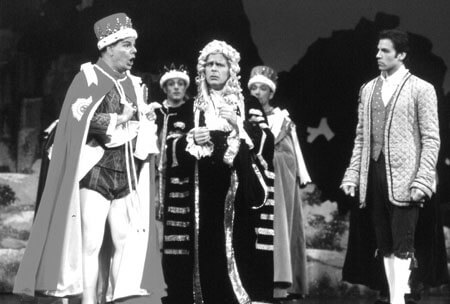A lesser-known Gilbert & Sullivan work plays light on its feet
Strephon, a 24-year old pretty boy who freely admits he’s “half a fairy,” laments living in a land where marrying his true love is illegal.
Sound familiar? Not so fast, since Strephon is a character in the operetta, “Iolanthe,” set in Victorian England and first staged in 1882, a decade before the term “homosexual” appeared in Webster’s and well over a century before gay marriage emerged as a tinderbox issue.
And yet, it’s no surprise the story strikes a genuine chord today. “Iolanthe” is, after all, from the mellifluous masters of satire, Gilbert & Sullivan, known for their uncanny knack for merging the traditional with the timeless, enabling their works to resonate for generations.
These undisputed grandfathers of modern musical theater packed their shows with iconic characters and enduring themes––nature vs. man, man vs. self, lover vs. lover, class vs. class, politics vs. politicos––then dressed them up in a fantastic, allegorical setting, lest their jabs cut too deep. They also injected a little soft slapschtick for good measure.
The deliciously divine “Iolanthe” (pronounced “eye-oh-LAN-thee”) kicked off the 30th season of The New York Gilbert & Sullivan Players (NYGASP), hailed as the “leading custodians of G&S classics.” This full-scale production boasted nearly 40 players and a 25-piece orchestra at the well-appointed City Center Theatre.
The plot of the operetta, farfetched even by G&S standards, revolves around Strephon’s desire to marry Phyllis, a mortal belle even more radiant than his fairy-mother, Iolanthe, who was banished, sentenced to, um, “penal servitude” for life, for her brief alliance with a mortal (Strephon’s father). Iolanthe is pardoned “five-and-twenty years” into her sentence by the Fairy Queen, a maternal figure—and a hefty round one, at that—presiding over a ring of daintily bumbling fairies.
The Lord Chancellor and his band of lesser lords, who comprise the vaingloriously brainless House of Peers, will not allow the union, and harbor a yen for Phyllis themselves. The fairies interfere, as they are wont to do, insisting that Strephon be given a seat in Parliament and steer legislation in their favor. No matter that he soon “runs amok.”
Will Iolanthe risk her life for her illicit half-fairy, half-mortal son so he may marry? Or will the conflicted Lord Chancellor snatch Phyllis up for himself? You’re guaranteed a happy ending with this gloriously fractured fairy tale.
Under the esteemed artistic direction of Albert Bergeret, who also serves as conductor, NYGASP has dazzled audiences for decades. While dedicated to faithful interpretation of these gems, they can’t resist the occasional dalliance with a current cultural reference, anachronism be damned.
For example, Strephon, whose dual personality enables him to push any bill, liberal or conservative, is called a “Parliamentary Kmart” because he “carries everything.” Later, the fairies chirp, “Prince William has come of age; he must not let his hormones rage.” At one point, to the audience’s delight, the name of Lincoln Center is invoked.
These tweaks are wholly in the spirit of the original—in some cases replacing otherwise woefully dated references—and even purists would find them unworthy of quibble.
The dull-yet-serviceable scenery, surely intentionally so by Jack Garver, effectively throws the loony characters, and their sumptuous costumes (by Gail Wofford) into high, giddy relief. The absurdly clever musical numbers, by Sir Gilbert, who wrote the libretto, and Sir Sullivan, the tunes, have never sounded better.
It’s hard to fight back a smile when the ludicrously smug lords enter the scene, bellowing, “Bow, bow, ye lower middle classes” and later admit, “Our disrespectful sneers, call forth indignant tears.” The requisite G&S-friendly choreography, updated by Robin Bartunek—a delirious series of hops, skips, turns, and trots—suits the silly proceedings just fine.
Bergeret valiantly paces the pleasantly effervescent score with the necessary aplomb, though there were moments where I’d have preferred he whip up the fizz factor a bit.
Brisk score or no, the stage comes alive when clear-voiced Kelly Ebsary, as the Fairy Queen, appears. The look on her face when The Lord Chancellor, upon discovering her identity, sings, “I took her for a proprietor of a ladies seminary” is a merry mix of comic outrage and indignation.
The always-assured Stephen O’Brien plays The Lord Chancellor with a panache that transcends cartoon—an autocrat with a tender heart. He nails his impossibly tongue-twisting patter song, the first couple of times, anyway. It’s a pleasure to watch him huff and squirm as Bergeret, from the orchestra pit, motions him for encore after encore. O’Brien takes our breath away as he breathlessly chokes out the inane staccato syllables.
David Wannen as Strephon, Jennifer Ly Ann Rose as Phyllis, and Erika Person as Iolanthe, are all charmingly splendid in their roles.
Though it’s too late to see “Iolanthe” (performances were limited to last weekend) this season, you can still catch NYGASP’s other topsy-turvy offerings, the more popular yet by no means more delightful “HMS Pinafore” and “The Mikado.”



































